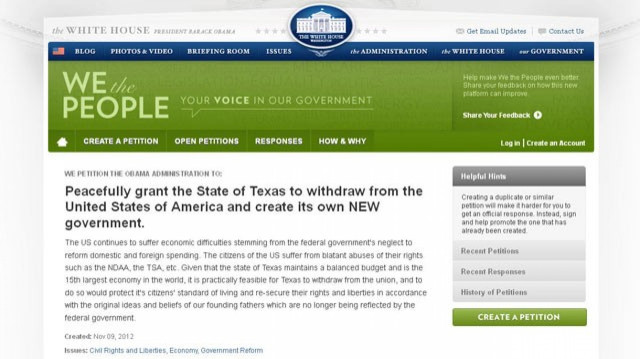Texas' Petition To Secede Shows States' Independence, What Is Secession?

Thousands of people have signed a petition suggesting that Texas should secede from the union.
The petition to "Peacefully grant the State of Texas to withdraw from the United States of America and create its own NEW government," surpassed 25,000 signatures on Monday at 3:22 p.m., after being submitted on Friday of last week. Petitions must reach 25,000 signatures in 30 days in order for the administration to release an official statement.
However, President Obama and his administration have yet to comment on the petition, but several officials have been vocal about suggestions of secession, including Texas Gov. Rick Perry in 2009 and treasurer of the Hardin County GOP, Peter Morrison.
So what exactly is secession?
Featured on a section of the White House website called "We the People," petitions allows citizens “with a U.S. zip code to submit or sign petitions about policy changes they would like to see,” according to ABC News.
The “We the People” website details that the petitions aim to give “all Americans a way to engage their government on the issues that matter to them.”
Secession refers to the act of withdrawing from an organization or union for the sake of achieving goals unrequited goals. While there are many types of secession, national secession suggests a state withdraws from the nation of which it is a part.
The United States has a long history of secession attempts. The most famous was the secession of 11 of the 15 southern states between 1860 and 1861 in order to maintain slavery as a legal practice. The states drafted and ratified the Ordinance of Secession during that time, and also ratified their own state ordinances, explaining their particular reasons for seceding. The states then came together and established the Confederate States of America. But the confederate nation was dissolved in 1865 upon losing the civil war.
Secession movements have remained active in America despite the U.S. Supreme Court deeming the secession of a state unconstitutional after the civil war. In recent times, several factions have established themselves as groups meaning to secede from the nation in states such as Alaska, California, Georgia, Hawaii, Texas and Vermont.
The Alaskan Independence Party was notably involved in the Kohlhaas v. State case in 2006, during which the Alaska Supreme Court deemed secession illegal and would not allow the proposal to be presented to Alaskan citizens for a vote.
When it comes to Texas, the lone star state has long thought of itself as more of a “republic” than a “mere state,” according to CBS News. But some also note that Texas’ independent nature does not mean that the state actually wants to be its own separate country.
"People around here are asking why Texas is so different from the rest of the country, why we see things so differently ... but I don't think a lot of people here are saying we ought to leave the Union," said Hardin County GOP Chairman Kent Batman.
Texas is not the only state where citizens feel they may be better off as their own nation. Some 20 other states also have secession petitions on the “We The People” website including Alabama, Arkansas, Colorado, Florida, Georgia, Indiana, Kentucky, Louisiana, Michigan, Mississippi, Missouri, Montana, New Jersey, New York, North Carolina, North Dakota, Oregon, South Carolina and Tennessee.
However, Texas is the first state to reach the amount of signatures required to garner government attention by its threshold date with a deadline of Dec. 9. The state of Louisiana for example, currently has 15,000 signatures for its petition and must reach 25,000 by Dec. 7.
© Copyright IBTimes 2024. All rights reserved.












